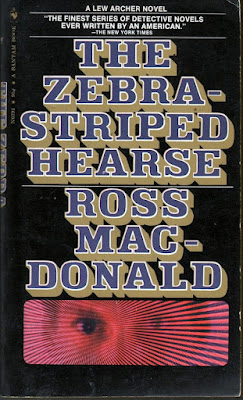Sometime during my mid-teens in the early 1970s, Ross MacDonald became my favorite writer. I'd had limited experience with "adult" literature, so I was bowled over by his convoluted tales of murder and sleuthing set in California, that impossibly glamorous and faraway land, especially when seen from a Canadian perspective. His stories seemed immeasurably more real and gripping than the cream tea world of Agatha Christie, who was the only other crime writer I was familiar with. I wasn't MacDonald's only fan. In the '60s he began to attract widespread critical acclaim and regular appearances on best-seller lists. He was even dubbed a great novelist, let alone a top crime writer. I'm here to report that we didn't know what we were talking about back then. I've reread a lot of writers I enjoyed when I was young and found them lacking in one regard or another, but I've rarely come across one who has so comprehensively failed the test of time.
Lew Archer is MacDonald's detective, and the stories are told from his perspective. Stylistically he follows in the footsteps of Raymond Chandler's Philip Marlowe. The main, and devastating, difference between the two is that Archer is both dull and annoying. He's less a character than a private detective bot that trundles around California asking suspects questions with the tirelessness and borderline rudeness of a customs inspector who's been called in to cover someone else's shift. Where Marlowe dropped ironic, flippant, and caustic remarks as a reaction to the nastiness and weirdness California threw at him, and did so with humor, Archer comes across as petty and nagging, a sort of gumshoe Karen. And his observations about life and the people he encounters are shallow, unimaginative, and seasoned with tidbits of pop psychology that feel like they were gleaned from Reader's Digest articles. MacDonald was, and is, strongly identified with California but his descriptions of the land and architecture are sparse and boilerplate.
Like all of MacDonald's work, these two novels feature murders caused by ruined or poisonous family relationships that have their roots in the past, usually with a psychological motive. People don't often murder for money in Archer's world. In Zebra, a young woman kills because she's jealous of her father's affection for a girl he regards as a surrogate daughter. In Dollar, jealousy rooted in parentage becomes the reason for murder. MacDonald is certainly skillful at constructing mystery plots that move quickly and hang together logically. Where he runs into trouble is in showing how Archer deconstructs the puzzles he's faced with. The plots are absurdly dependent on Archer sub-contracting his investigations to contacts he has in law enforcement all over California. He picks up a phone and asks a detective to check out this or that, et voila, a few pages later he gets a gift-wrapped piece of crucial information. In a similar vein, when Archer questions someone they frequently spill their guts to him faster than you can say "I don't think so." This makes the novels brutally efficient examples of storytelling, and yet lazy at the same time.
MacDonald's writing has aged poorly in the usual ways: teenagers and young adults are faintly ridiculous creatures with their interest in music and surfing and not wearing fedoras; modern art (modern anything, really) is weird and pretentious; and the defining characteristic of women is how attractive or unattractive they are, with a special emphasis on the size, shape and movement of their breasts. Not surprising stuff for the era, but coupled with his other deficiencies it makes MacDonald a tough author to look back on with fondness. So what can I say? We had lousy taste in detective fiction back then. Sorry.


No comments:
Post a Comment